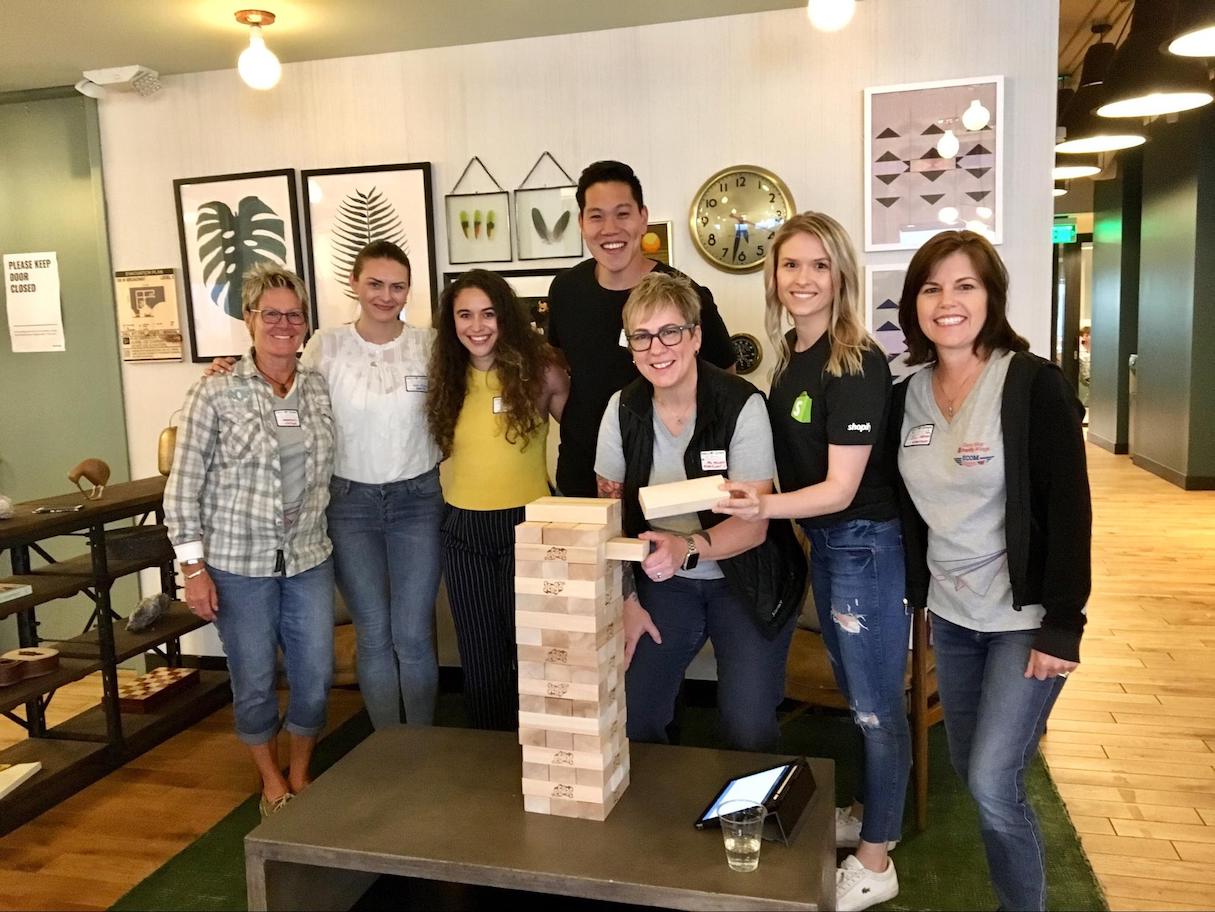'The richest people in the world look for and build networks; everyone else looks for work.'
Robert Kiyosaki knows a thing or two about building your net worth—having written the #1 personal finance book of all time—so when he tells us how rich people act, we listen. Even more so when his advice involves networking.
Simple advice, hard execution. It’s why a majority of people aren’t game to network; a smaller number might, but do it inefficiently; and only a select few will get it just right.
I’m here for the middle group—the ones who are open to it, but haven’t seen any results—to share with you best practices that will transform how you network, and even help you have some fun with it. In this post, we’ll look at just how building your network can grow your business, and how to leverage those best practices to create impactful relationships with others in your industry.
The impact of your network
It goes without saying that building and nurturing a network is one of the most powerful things you can do for your success, but it’s rarely executed well enough to achieve intended outcomes. For many business owners, there isn’t enough time or resources, and ultimately, building your network is a long term play that won’t immediately validate today’s efforts. As a result, many owners will stop before they even start.
As a Strategic Partnerships Manager at Shopify, I’ve seen first hand the exponential impact that networking and forming partnerships has had on our top partners. It’s the little unspoken secret behind the biggest growth stories. Surrounding yourself with passionate people is key to happiness and success , and developing partnerships with other agencies and technology partners allows for a more predictable and scalable future. Aligning with like-minded peers also allows you to share tricks, tips, and even leads. If that’s not enough, leveraging the influence of other reputable businesses will boost your clout and can help position you as an expert.
, and developing partnerships with other agencies and technology partners allows for a more predictable and scalable future. Aligning with like-minded peers also allows you to share tricks, tips, and even leads. If that’s not enough, leveraging the influence of other reputable businesses will boost your clout and can help position you as an expert.
"Aligning with like-minded peers allows you to share tricks, tips, and even leads. If that’s not enough, leveraging the influence of other reputable businesses will boost your clout and can help position you as an expert."
Anything that gets you connecting with others will do the trick—online, offline, in communities, with partners, with small businesses, and with us at Shopify! Start small today, but continue evolving your approach. As you grow, keep in mind that an eventual hire might be a partnerships manager, who oversees the bulk of your agency’s relationships.
Now that we’re all in on the secret, here are some best practices that will ensure your efforts are win-win-win: good for you, good for the partner, and good for your shared customers.
You may also like: The Shopify Partner Business Philosophy: Community Over Competition.
4 partnership best practices
As I alluded to earlier, I’m not here to sell you on the perks of networking, nor am I here to tell you how to do it. Instead, I’d like to share some mind shifts that will change the game for you in your networking efforts. These practices consistently show up in every successful, joyful, and energizing person I meet, and I’ve seen first hand how implementing them into your daily life—let alone networking—will bring you an abundance of success.
1. Be authentic

Being authentic is the first best practice I’ll touch on, and for good reason: without authenticity in networking, nothing else you do will matter. People buy energy—be memorable, be engaging, be someone they want to have a drink with!
This is why partnerships are a long term game. Anyone who expects to strike a deal the first time they meet someone is doing it wrong. Don’t forego valuable relationship building for a quick win. Instead, work on building your impact and influence.
Influence is based on perceived authenticity and trust built from years of friendship and communication—it’s where the bulk of real and lasting business happens. In today’s world, we can fast track this by having a consistent brand online and offline, so when someone meets you, they can continue getting to know you and communicate with you through your online presence.
This is a topic for another post, but what it boils down to is: know what you stand for. Without knowing this, you won’t have a foundation on which to grow your influence. Be clear about your value proposition and why you’re the best in your niche, but be transparent with what you don’t know.
As you put yourself out there more—both online and offline—you will catch the eyes of like-minded peers who align with your message and brand. You’ll have the right foundation in place to grow strong, meaningful, and mutually beneficial connections. After all, a strong relationship can give you a competitive advantage. You’ll be the first agency they think of when a new opportunity comes in or a client asks them who to work with.
The surest way to ensure you’re showing up authentic is to shed any expectations and focus on how you can provide value to others, which brings me to my next point.
Takeaway: Build a consistent, authentic brand offline and online, and let people get to know what you have to offer.
2. Give more than you expect in return

Helping others realize their goals is the surest way you’ll get real value in return . Take a moment for a pulse check—are you giving more than you receive when networking or building your connections? This is universal across anything in life, but even more important in relationship building: you get what you put in.
. Take a moment for a pulse check—are you giving more than you receive when networking or building your connections? This is universal across anything in life, but even more important in relationship building: you get what you put in.
There’s an interesting phenomenon where the people giving the least value are the ones complaining the loudest. Conversely, those who know better and replace ‘complaining time’ with ‘give more value time’ are the ones who reap the biggest rewards. Unless you’re first to provide a strong value proposition, don’t expect anything in return.
You can start by giving value in small ways: Try to be of assistance whenever possible. Build up your “value bank” by sharing your knowledge through forums or blog posts, connecting two people who may benefit from each other, or offering authentic advice on podcasts. Giving freely should become natural.
Inspired by the free giving of other partners, Scott Austin from JadePuma has made it a key part of his business.
“When we first started working with Shopify on behalf of our customers, we were inspired by the amount of content created by the community,” Scott explains. “As we consumed and benefited from that, we wanted to give back and add our own learnings to what is available.”
Beyond his involvement in the Shopify Forums and the Shopify Partners Facebook group, Scott has a growing portfolio of free tutorials and articles that address the most common hurdles that his clients face, as well as free consults for store owners at every level of building their business.
“Our consults are not focused on selling our services. Instead, we provide store owners with an expert view into their business and a prioritized list of action items,” Scott says.
While he set out to give back to the community—which was there for him when he joined as a Shopify Expert—Scott has also proven himself as a trusted advisor, someone who educates and inspires.
Takeaway: Look for opportunities to help your community. Become a trusted source of advice.
3. Personalize your approach

As your network begins to grow and relationships strengthen, you’ll start finding opportunities to partner or work closer with others. Remember that you’re dealing with unique and emotional people. Part of being able to provide value is understanding that each partnership will look different, will require upkeep, and will thrive in different conditions. Have your goal in mind, but be flexible in how it manifests.
First, make sure you align yourself with those who fit your message and brand. Then start exploring their business to see how they could benefit from the partnership. With such a variety of skill sets between Shopify Partners—marketing, development, and photography, to name a few—there are countless ways to build successful partnerships that are uniquely tailored to the strengths of each partner involved. Know your audience, their communication preferences, and what goals they’re looking to achieve.
"The foundation for every productive partnership begins with a deep understanding of what each side brings to the table and what you're each trying to achieve."
One of Shopify’s top marketing partners, Klaviyo, has a strong partnerships culture. They follow a two-step approach to ensure both sides will succeed and scale through the partnership:
1. Build a deep understanding of partners' business goals and motivations
The foundation for every productive partnership begins with a deep understanding of what each side brings to the table and what you're each trying to achieve.
Take the time to get to know your partners—where is their business today? Where do they want their business to be tomorrow? Develop incentives based on what motivates them and helps them get one step closer to achieving their goals. When your partners' businesses succeed, yours does as well.
2. Develop partner “types” as your ecosystem grows
When you start out, it’s natural to group all partners into one bucket. You put them all in one track with the same incentives, expectations, and support. However, as your partner ecosystem grows, different partner groups will emerge with unique needs. When this happens, take time to identify your partner segments, what their motivations are, and how you'd both like to work together moving forward.
Understand what gaps your partners fill—are they supplying you with leads? Providing complementary services? Supporting your mutual customers? Extending your product's experience through an integration? Create high-level partner categories based on how they want to interact with your company, in a way that clearly conveys their value both internally and externally. Not all partners are the same, and that notion should be embraced.
Takeaway: Figure out your unique offering and arrangement with every potential partner you approach.
4. Be collaborative

Gone are the days of climbing a ladder and pushing others down for individual benefit. Thankfully, we’re evolving into kinder and more conscious business people, who rally behind a universal mission or purpose rather than personal accolades.
Today, it’s about following your unique path and surrounding yourself with like-minded hustlers who will accompany you on this adventure, and not about power plays or self-serving. In agency-speak, this is apparent with those who have created a niche for themselves and are thriving in their zone of genius. Because of their unique offering, most other agencies become a complimentary piece of the puzzle—not a competitive threat.
who will accompany you on this adventure, and not about power plays or self-serving. In agency-speak, this is apparent with those who have created a niche for themselves and are thriving in their zone of genius. Because of their unique offering, most other agencies become a complimentary piece of the puzzle—not a competitive threat.
Switch your mindset to one of abundance. There’s plenty of work out there for everyone!
"The most successful Shopify Partners are the ones who collaborate the most, share leads, join forces to build communities."
From my experience here at Shopify, the most successful partners are the ones who collaborate the most, share leads, join forces to build communities, and attend events without a hidden agenda.
One such partner is Mo Nelson from EcomFlight, who joined as a Shopify Expert in December 2017. Within her first six months in the program, Mo launched a meetup series in Long Beach, California. The 100-person turnout on her first event is a reflection of the genuine mission she has for growing the local community of Shopify partners and merchants.
“The more we learn about each other—the struggles and what we do best—the more we can all help each other succeed and take our businesses to the next level,” says Mo.
Her meetup series continues to be a space for collaboration and support for partners and merchants alike. For anyone in the Los Angeles area, be sure to visit.
Takeaway: Look for ways to get involved, collaborate, and support the growth of other partners.

You might also like: The Power of Community: How Business Networking Can Nurture Your Growth.
Partnerships are the secret to success
The bottom line is that making sure your business is rich not only with financial capital, but also with social capital, is the secret to growing a sustainable business. Your ability to build a network of authentic relationships, while staying true to your passions and values, will be the most important asset in your portfolio. Your network truly is your net worth.
Read more
- Grow Your Freelancer Network: Solve Problems, Get Clients
- Email Deliverability: 5 Ways to Build a Strong Sender Reputation
- Shopify’s Director of Design Talks Tools, Trends, and How to Take Charge
- Introducing the Next Shopify Partner Accelerator
- Add Product Photography to Your Service Offerings With These Tips
- Facebook Marketing: Six Steps to Auditing Low Performing Facebook Ads
- What I Learned From Being My Own Client
- 5 Ways to Help Clients Succeed in the Build A Business Competition
- How to Use Google Ads to Drive Traffic to Your Clients' Sites



